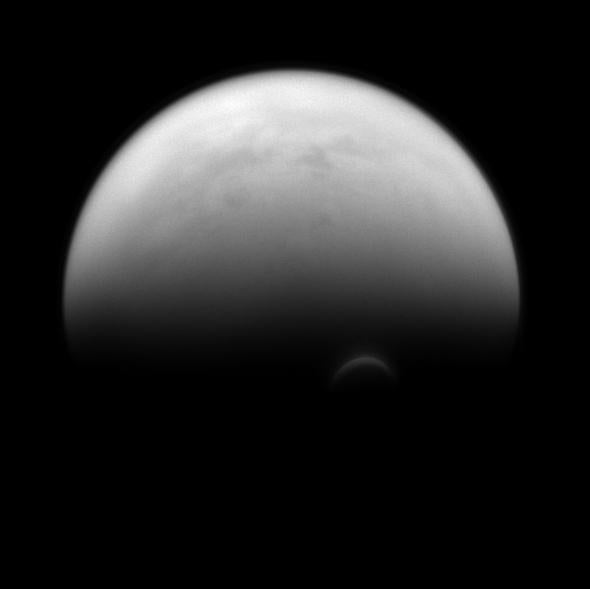When you take a picture of an object, a funny thing happens: The three dimensions of the actual scene are reduced to two, and you lose perspective. Distance is flattened, so for example two things at very different distances can look right on top of each other.
It also makes spheres look like flat circles, which can be confusing. If you want to figure out what’s going on, you need to look at clues in the picture itself.
Titan is the largest moon of Saturn, and has a thick nitrogen atmosphere. At Titan’s south pole there is what’s called a vortex, an oval-shaped stream of air that circulates above the moon’s thick, hazy upper atmosphere. The Cassini spacecraft has observed it many times, even allowing the creation of a way-cool animation of it swirling.
But how do we know it sits above the haze, and not right on it? Because of pictures like this:

Photo by NASA/JPL-Caltech/Space Science Institute
Cassini was flying over the south pole of Titan when it took this shot on July 14, 2013. You can see the vortex as a crescent, lit from the side, and it’s located well into Titan’s night side. That means it must be up higher than the surrounding material — it’s still illuminated by the Sun, while the lower material isn’t. It’s like seeing the top of a mountain in the west lit by the rising Sun while the base of the mountain is still shrouded in darkness.
This picture was taken using an infrared filter, by the way, and IR light can pierce the thick haze. Visible light gets blocked, but IR light from the surface of Titan can get out, allowing us to see features on the ground. We even have global maps of the moon made using infrared light!
I love pictures like this, which reveal information for free just by thinking about them a little. And besides, who knew Titan had a belly button?